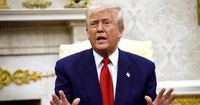Global stocks and U.S. futures showed signs of recovery on April 8, 2025, following a significant downturn the day prior, amidst ongoing tensions in the trade landscape under President Donald Trump. The rebound came after markets experienced their worst day since the onset of the COVID-19 pandemic, driven by fears surrounding Trump's aggressive tariff policies.
On April 7, Trump announced that numerous countries are now eager to negotiate trade deals, a statement that accompanies his administration's implementation of sweeping tariffs. These tariffs, which are set to take effect at midnight on April 8, could see rates as high as 50% on Chinese imports unless Beijing retracts its retaliatory tariffs.
Jamieson Greer, the newly confirmed U.S. Trade Representative, faced intense scrutiny from senators during a Finance Committee hearing on the same day. Greer was questioned about the implications of the tariffs, particularly their impact on American families. Senator Ben Ray Lujan (D-N.M.) pressed Greer on whether he agrees with Trump’s assertion that families will feel financial pain as a result of these tariffs, to which Greer responded, "Of course, I agree with the president," emphasizing the need for a shift away from the status quo in trade practices.
Senator Elizabeth Warren (D-Mass.) advocated for Congress to reverse Trump's tariffs, arguing that they pose a risk to American jobs and the economy. Warren stated, "Congress has the power to reverse these tariffs, and we should do so immediately," reflecting a growing concern among lawmakers about the economic fallout from the administration's trade strategies.
During the hearing, Greer defended the tariffs as a necessary measure to address the $1.2 trillion trade deficit, which he attributed to the previous Biden administration's policies. He insisted that the tariffs are not a trade war but rather a strategic move to negotiate better terms with trading partners, stating, "Senator, this is not a trade war." However, his comments were met with skepticism from several senators, who questioned the broader economic strategy.
Senator Ron Johnson (R-Wis.) urged Greer to focus on specific products rather than implementing blanket tariffs, warning of the collateral damage that could arise from such an approach. He noted, "People are already feeling that pain, so I hope you're sensitive to that," highlighting the concern that many American businesses could suffer due to increased costs and disrupted supply chains.
Meanwhile, Senator Mark Warner (D-Va.) described the market's slight recovery as merely a "good day in hospice," suggesting that the long-term outlook remains bleak amid Trump's tariff policies. He criticized the administration for imposing tariffs on allies, including Australia, questioning the rationale behind such actions when the U.S. has a trade surplus with those nations.
As the political fallout continues, the European Union is also preparing to retaliate against Trump’s tariffs, with President Ursula von der Leyen emphasizing the need for a negotiated resolution to the ongoing trade tensions. In a recent conversation with Chinese Premier Li Qiang, von der Leyen stressed that both Europe and China have a critical role in maintaining a fair global trading system.
In a separate development, the Supreme Court ruled in favor of the Trump administration, allowing deportations under the Alien Enemies Act, provided that affected individuals can challenge deportation orders in court. This ruling adds another layer of complexity to the administration's controversial policies.
Trump is expected to sign an executive order later today aimed at "unleashing American energy," reflecting his administration's broader agenda to boost domestic production. Additionally, he will address House Republicans at a dinner, where he is likely to discuss his administration's trade policies and garner support for his agenda.
On the international front, South Korea's trade officials are set to visit Washington to negotiate a reduction in tariffs, as the country seeks to alleviate the impact of Trump's new duties. This visit comes as Trump indicated that countries other than China may have opportunities to negotiate more favorable terms.
Despite the optimism surrounding negotiations, some business leaders are expressing concern about the long-term implications of Trump's tariffs. Ken Griffin, founder of Citadel, called the tariffs a "huge policy mistake" that could harm middle-class Americans and undermine U.S. leadership in global trade.
As the trade landscape evolves, the implications of Trump's tariffs remain a focal point of discussion among lawmakers, business leaders, and international partners. With many stakeholders invested in the outcome, the coming days are likely to reveal further developments in this high-stakes economic environment.
In summary, the ongoing trade tensions under Trump's administration are creating a complex landscape for global markets, domestic businesses, and international relations. As negotiations unfold, all eyes will be on how these policies will shape the future of U.S. trade and its economic standing on the world stage.






